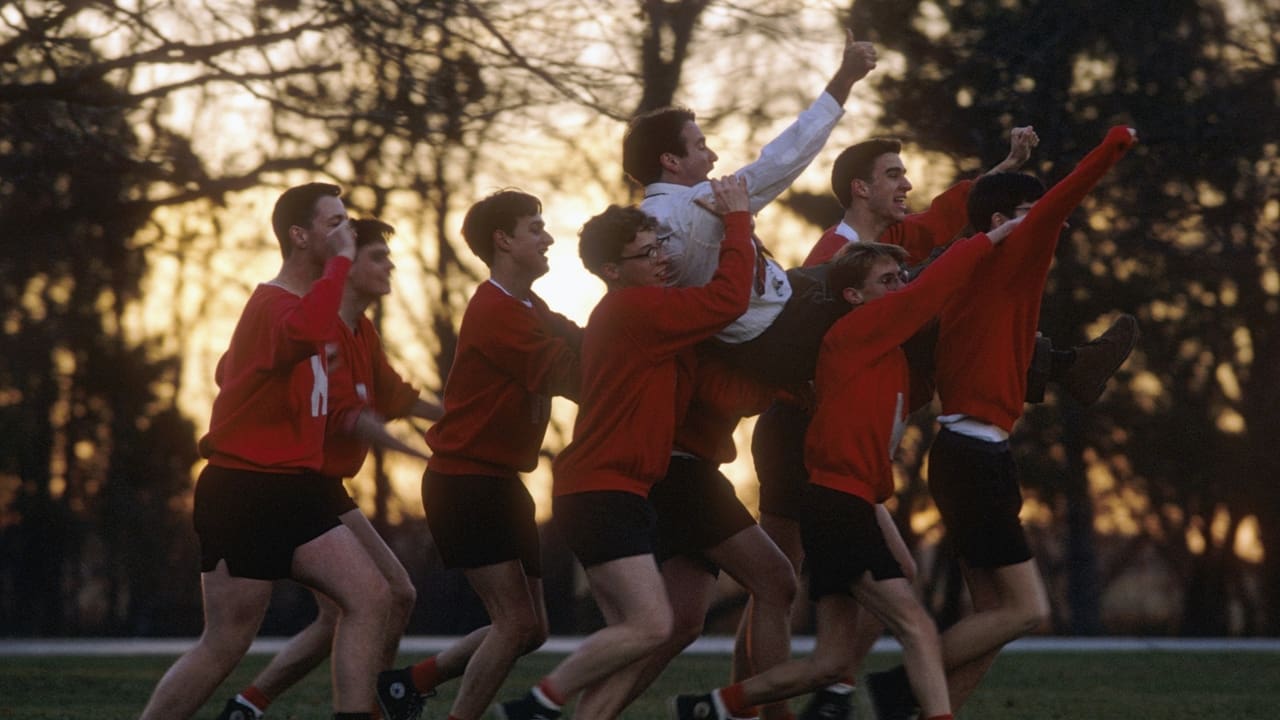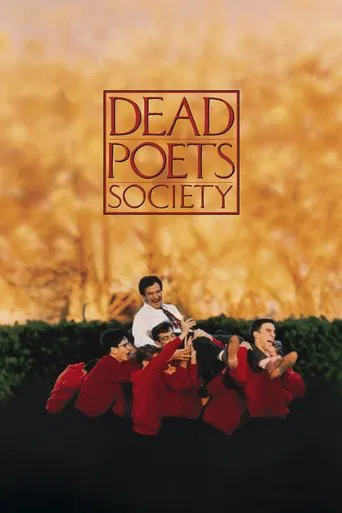Conall McCormick
I find it ironic that I am attempting to provide a, largely, objective assessment of this film; a task which the film's main character, John Keating, a poetry teacher, would view with derision. His personal philosophy is that poetry (and by extension, I imagine, all other forms of art e.g. filmmaking) should be viewed entirely subjectively. That art cannot, or should not, be objectively scrutinised but that the importance of any piece of art is in the emotions that it may evoke in its audience members. The reaction of the audience member to any piece of art is, of course, unique to the individual and that is where the value truly lies. Keating's intellectual adversary in this film is the author of the "Introduction to Poetry" Mr Pritchard. His assessment of poetry is cold and detached, believing that poetry can be objectively assessed like a mathematical formula in order to determine its importance. This dogmatic view is, naturally, in the same line of thinking as the strict, prestigious school that the film takes place in. The school is seen to be ruthless in the application and preservation of this soulless mentality which indoctrinates its students. It is, of course, the clash of these contradictory ideologies which creates the central conflict of the narrative. However, I do have major disagreements with how this conflict is presented in this film. Namely, that the film is rather simple in its assessment of this rather complex issue and presents it in a black and white fashion. Keating is seen as the hero of the narrative and his philosophy is presented as, ironically, the objective truth in the overall question. I feel that the school and, the figure of Mr Pritchard, come across as quite exaggeratory and caricatural in the examination of the opposing philosophy. As an agnostic nihilist I understand that life is meaningless and that the only option humans have is to ascribe meaning to whatever we deem appropriate. That is to say that, to the fullest extent, Mr Keating is 100% correct in his worldview. That the examination of art IS entirely subjective because there can be no objective standard. On the other hand, the strict adherence to this worldview is, I find, extremely problematic. There may not be an objective standard for the arts or to the meaning in life but humans do need that structure to exist as a society AND to adequately assess the arts. I think to prove this point I think one merely needs to look at the modern art scene. The current school of thought that "anything is art" also means that "nothing is art" as a consequence. It's a sad state of affairs when an unmade bed can LITERALLY be deemed as a work of art and can be perceived as being of equal worth as, say, the ceiling of the Sistine chapel. Under Keating's worldview the two are inherently (but more importantly readily PERCIEVED) to be equitable since there is no objective standard (other than what one ascribes). This is what, I feel, has led to the degradation of modern art where the skill and artistry derived from objective standards and tutelage in the past has been lost/overlooked. Indeed, in the film Keating is faced with the problems of his own ideology. One of the students produces a poem that reads "The cat sat on the mat" which mockingly exposes the flaws of his philosophy. One of his students becomes quite anarchic when he buys fully into Keating's worldview only to be (arguably hypocritically) reprimanded by Keating himself for his actions. To further illustrate this point I shall use another example. With nihilism, and the lack of objective meaning, there is no reason WHY a man couldn't kill another man if he felt like it (if he knew he could get away with it) as there is no reason why he should or shouldn't do so. Naturally, the reader of this review understands this to be an "objective wrong" as that is the reality of the society we have been conditioned by. Therefore, that obejctivity exists (if not in the truest sense). Ultimately, Keating is correct in that the reason we have the arts is for the emotions that they evoke in us and the value that we ascribe to them. There are plenty of "objectively" bad movies that I love but the fact that they are objectively flawed doesn't hinder my enjoyment of them. However, I do think that the acknowledgment of these flaws is of crucial importance. In short, to justify my ACTUAL review of this film (which I haven't even STARTED yet!) I first had to tackle its underlying philosophy to explain the legitimacy of my objective assessment. Yes, it is true that any piece of art (be it poetry, filmmaking etc) is entirely subjective to the fullest extent. However, practically speaking, it is really more of a mix between the objective and the subjective; even if the objective is merely a delusion which we (as a society) collectively endorse. With that lengthy explanation in mind I can now identify what I understand to be the objective assessment of this film. I think that, before attributing one's subjective value onto a film, a baseline must be set determined on the objective success (or failure) of a film on a technical level. This film is around the 7/10 mark (i.e. a "good" film) as far as I'm concerned. I can certainly understand why people would give it between a 5 ("average") and an 8 ("great") out of 10 as this is where the grey area lies as to the range out emotional investment and subjective assessment exists. However, to give this film any higher or lower (I think) lacks real insight into the strengths, or limitations, of this work.To begin with, I feel that the narrative was solid and enjoyable. The dialouge inparticular is its greatest quality and produces some really great interactions between characters. The character of Mr Keating (played by the late-great Robin Williams) is the centrepiece of the film and the source of its wise and insightful dialouge. Williams is more witheld in this film than his other films but this only serves to create an enigmatic aura around his character. He exudes a great warmth and passion which is made readily evident. Its a good performance but certainly not his best ("Good Will Hunting") as his character doesn't have a great deal more depth beyond his role as an educator and mentor to expose weaknesses in his character. The limitation of the film is that the story is very predicatable and there was no point when I was thrown off track. The change in events that occur in this film is down to the shifting motivations of the students. Of the large group, three are of prime focus: Neil, who feels oppressed by his father, Todd, who is experiences problems with his introversion and Knox, who is too shy to talk to the woman he loves. By these brief explanations of these three protagonists you can almost already figure out what the end result will be. This is largely what prevents the film from ever attempting to reach a higher threshold of significance. Despite the limited scope of the narritive this is beneficial to the film in the fact that it keeps it well contained and is as clear and concise as it could have been. I'd say that the antagonists in the film (being the principal and Neil's father, among others) are very one-dimensional and don't really enhance the story greatly. However, since the overall point of the film is to challenge and resist conformity it is, perhaps, beneficial in a much broader wider context with this in mind. The performances from the extended cast (beyond Robin) are very good and for a film that really depends on the strength of its young actors does a terrific job.The direction for the film is decent and there is some interesting cinematography, namely in one classroom scene which provokes a suitably nauseating and disorienting experience for the viewer which puts us firmly in the shoes of one of the characters expertly. However, the cinematography and direction (at least from a visual standpoint) does not reach a "great" level of quality. To conclude, I shall now talk about the subjective experience I had when watching this film. It is easily understood why so many people have such an endearment towards this film. Its message is simple. "SEIZE THE DAY!" is the Keating's mantra as he implores his students (and more importantly the audience) to make the most of their lives. It is a remarkably simple message, but it is one which is not readily appreciated in day-to-day life in modern society. It is easy to see why people are so affected by this film as they face the humdrum monotony of daily living. I think a criticism which people have of this film is that some of the characters (namely the students) come across as quite pretentious. Whilst I can certainly see WHY people may have this perception, I don't think it is an accurate one. Mr Keating's ambition for the children is for them to be able to think for themselves, nothing more, nothing less. Mr Keating is helping the students start their journey to self-discovery but does not presume to hold the answers. Other than the issues I have with the conflicting ideologies (which I identified earlier in length) I feel that the film deals with its themes and subject matter adequately. As the film's final scene highlights, there will be people who will be deeply inspired by this film and there will be those who will scoff and will deem it to be overly sentimental. I can appreciate the opinions of both in regards to this film but I think that, ultimately, there is enough quality in this film to justify the 7/10 rating from myself.
zianimustafa
This film, which inspired and changed the lives of many, gives us a story: about the English professor John Keating
(Robin Williams)
In a boarding school, the Wilton Academy, where the students are studying, the professor enters the life of the Academy studentsTo inspire them to love life and change their lives forever, when it makes them think in a different unconventional way and with a lot of rebellion.
The film contains a collection of beautiful poetry quotations ..
Including the quote from a poem by the English poet Robert Helek:
"Gather the buds as long as you can, the old time is still flying, and the same flower that smiles today will die tomorrow"
The film also contains a lot of wonderful ideas .. Of which the professor said to his students:
"We do not read and do not write poetry because it is funny, we read and write poetry because we are members of the human race, and the human race is full of emotion.
Medicine, law, business administration, engineering .. is a noble and important character in order to preserve life
But poetry is beauty, romance, love, these are the things we live for. "
And the beautiful film also:
That he knows them on the slogan "Carpi Diem," which is Latin means "nest your day"And teaches them how to "extract the essence of life" from every moment, how to think for themselves and choose their own wayEven if he is uneducated or strange, to have the courage to defend their ideas and beliefs, to face the power that is trying to paintTheir way and their future without any consideration for their feelings and emotions.

